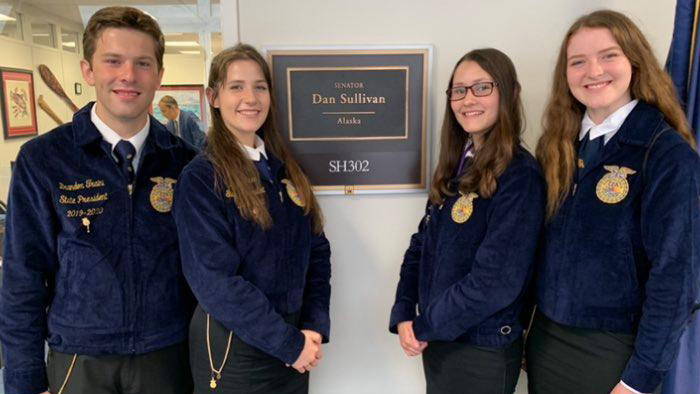FFA from Alaska to Nebraska

By Mary Crawford, NCTA News
Gillian Brinker, who was a state FFA officer in her home state of Alaska, is now active in promoting FFA in another “aska” environment.
Brinker is a freshman studying equine industry management at the Nebraska College of Technical Agriculture in Curtis.
She has been involved in FFA activities for eight year, and most recently was the 2019-2020 Alaska FFA Association State Vice President.
Now located at college in southwestern Nebraska, Gillian is vice president of the NCTA Collegiate FFA/4-H Club. Interestingly, she joins club officers from three other states – Nebraska, Colorado, and Minnesota.
A “city girl” who was raised in Anchorage, the largest city in Alaska, Brinker developed an interest in agriculture by taking horse riding lessons when she was eight or nine years of age.
“Although I am a first-generation agriculturist, my family has been extraordinarily supportive of my many, animal related shenanigans,” Brinker says of FFA projects which include teaching beginner horse riding lessons for four years, and raising Nigerian dwarf dairy goats for three.
She was home-schooled by her parents, and had her mother help her found the Northern Sky FFA Chapter through FOCUS Homeschool.
Sparsely populated Alaska has three certified agricultural education teachers and one state FFA advisor.
“I credit my mother for my success in FFA,” Brinker says.
Through chapter events, statewide duties, agricultural advocacy, and legislative visits with Alaska’s elected officials and Capitol Hill in Washington, D.C, Gillian attributes her public speaking, people skills and confidence to FFA.
“I am planning to receive my American Degree next year,” Brinker says. “I am technically eligible now; however, I was hoping to finalize my records and add some more hours to AET over this school year while at NCTA.”
So, just how did an FFA leader from Alaska end up on a college campus in Nebraska?
“NCTA was my school of choice for many reasons; however, the main components that interested me most whilst I was searching for a college to attend was the small class sizes, the approachable professors, the hands-on interaction with livestock and horses, and the inviting community both on campus and in town,” Brinker shares in an essay.
Brinker’s college search started online and included visiting a booth at the National FFA Convention and Expo.
She came to NCTA to further immerse herself in production classes, and to add expertise to her 10 years of horse riding and teaching with the NCTA equine program.
Her goal in carving a carefully designed career path is to eventually own a small farm in Alaska with horses, laying hens, dairy goats, a garden, and greenhouses. That vision is based on her FFA projects and SAEs, concerns for food security, and opportunities in Alaska for agritourism which include hunting and fishing.
“In my home state, we import about 95% of our food, so we would last about a week without these imports,” Brinker notes. “Food production and agriculture advocacy is important.”
Until her graduation from NCTA in May 2022, Brinker said she will continue her advocacy for agriculture and FFA at each opportunity.
“I love being in the blue jacket, that’s for sure.”
Part of the University of Nebraska system, the Nebraska College of Technical Agriculture is a two-year institution with a statewide mission of preparing students for successful careers in agriculture, veterinary technology and related industries. NCTA is known for its affordable tuition, high job-placement rate for its graduates, and for the success of student teams in competitive activities including crops judging, ranch horse events, livestock judging, shotgun sports, stock dog trials, and intercollegiate rodeo. The college is consistently ranked as one of the best two-year schools in the nation.
Download a PDF of this press release